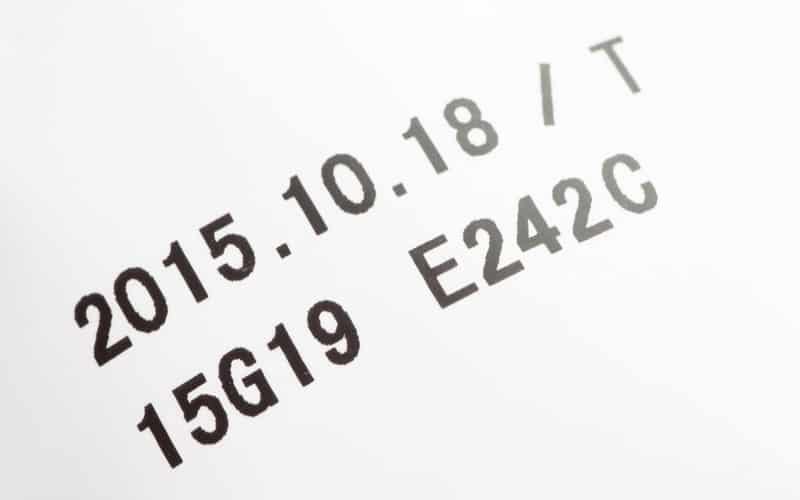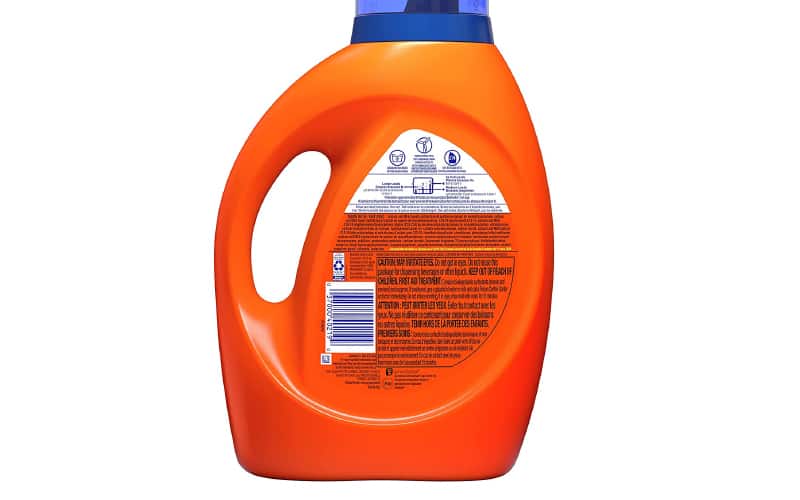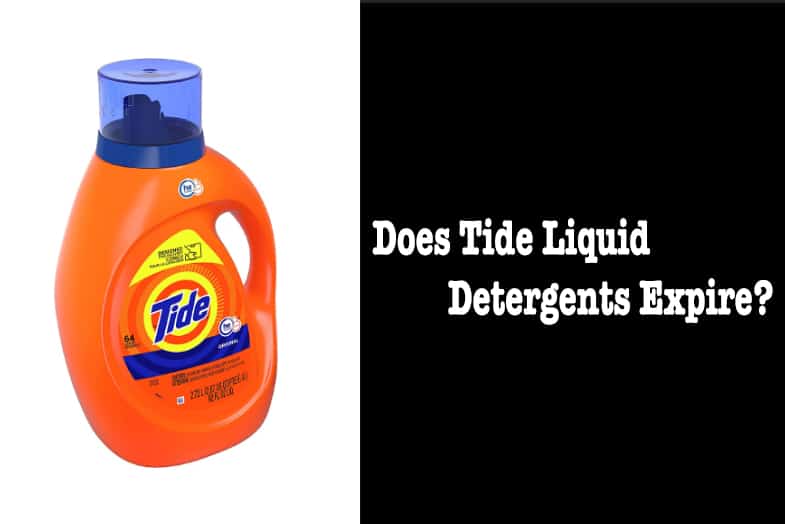We all clean clothes all of our lives, but have you ever considered the most important component of the process: laundry detergents? Have you ever thought that cleaning agents expire? Or is there a time limit on it? How long will a detergent take to expire?
Furthermore, if you are a firm believer in planning ahead, you may have laundry detergent supplies in your house that you can use when the time comes. Is that detergent going to expire? Yes, however, the timing varies depending on the detergent.
Detergents lose their efficacy after a certain time, but their toxicity does not grow. The average shelf life of liquid detergent is six months to 1 year. Dr. Scott Leckledge and Dr. Mark A. Benveuto (a professor of biochemistry and chemistry) also mentioned that some laundry detergents, such as white vinegar and baking soda, never expire.
Usually, people make stocks of their household items to ensure their availability when needed. Similarly, they prefer buying detergents in bulk quantity without knowing the fact that they can expire a significant quantity of it.
It is advised to make an idea of the exact quantity of detergent that is used in a week or a month and then purchase only that quantity to save money and clothes. People buy grocery items in bulk during the sale season in grocery stores, which is not recommended in the case of laundry detergents.
What Is an Expiration Date?
The expiration date or the expiry date is the date printed on any product by the manufacturer. It tells the consumer about the last date at which anyone can use the product safely. After that, the product will no longer be safe to use.
Expiry dates are sometimes mistaken for best-before dates, although there is a significant difference between the two. Consumers can use best-before dates to determine how long a product will remain fresh and if it can be used after that date has passed. Expiration dates are for products that should not be consumed on or after that date.
Expiry dates are not only for edible products but for inedible products as well. Even identity card and debit card has specific expiry dates. Similarly, laundry products like liquid detergents also expire after a certain time duration. This time duration is referred to as shelf life, which varies with different types of detergents.
Why Do Detergents Expire?

Products expire when the active components in them begin to lose their power. Laundry detergents have active ingredients like surfactants and other organic components. They expire when these components lose their potency.
Like all other products, preservatives are added to laundry detergents to increase their shelf life. Because of the presence of preservatives that are added to products, they are able to work properly for a long time. Without preservatives, any product, including liquid detergent, can easily lose its efficiency after some days of its manufacture date.
Read More: How to Use Liquid Detergent and Dosing Balls?
What Happens When Laundry Detergents Expire?
Laundry detergents come in various forms, such as liquid, powdered, Solid, and single-dose laundry detergents. Different forms respond differently to different conditions. Although their toxicity does not increase after the expiration date yet, their effectiveness will be affected.
- Liquid Formula Laundry detergents
After the expiration date has been reached, the manufacturer cannot guarantee that the product will begin to degrade or that the components will separate. After the expiration date, you can still use the product, but it will clump on the bottle. As a result, you must thoroughly shake the bottle before using the detergent each time. - Homemade Liquid Formula Laundry Detergents
Usually, homemade liquid detergent becomes hard or cakey; you should discard it whenever it happens. It usually happens with homemade soaps because they lack anti-caking chemicals and soake readily. Make small amounts of these detergents that can be used immediately and keep them in an airtight container. - Powdered Formula Laundry detergents
Laundry detergents with a powdered formula never lose their effectiveness unless they are exposed to moisture. If you discover clumps while opening the detergent container, filter it and move it to a fresh container. The powder does not completely dissolve in the laundry, leaving soapy residue on your clothes. - Single- Dose Formula Laundry detergents
A polyvinyl coating protects these detergents. This coating is designed to dissolve quickly. Unfortunately, damp hands can convert them into huge lumpy clumps and ultimately dissolve them.
Always keep these detergents away from water and close the airtight lid. Moreover, avoid touching the container when your hands are wet.
Expiry Date Of Tide And Other Liquid Detergents
In most cases, the expiration date or best-before date is mentioned on the packaging of the liquid detergents. One should check these dates before purchasing. Liquid detergents do not really expire, but they break down and lose potency.
If these dates are not mentioned, then the best thing to understand is that all liquid detergents have the best shelf life from 6 months to 1 year after opening the packaging. In addition, if they are left unopened, then they expire in 9 months to 1 year.
Powdered laundry detergents have less shelf life as compared to liquid laundry detergents. The shelf life of powdered laundry detergents is just six months.
Read More: Liquid Vs. Powder Vs. Pod Detergent: What Is the Difference?
Preservatives That Are Added In Liquid Detergents
A preservative is a chemical that is introduced to items, including laundry detergents, cosmetics, wood, food, drinks, biological samples, pharmaceutical medicines, paints, and many other products, to keep them from decomposing due to microbial growth or unwanted chemical changes.
Furthermore, preservatives and fragrances are the most important factors of any product. They can be considered as key ingredients of detergent industries. Both are mentioned on the product packaging if anyone wants to check. Luckily, in the 21st century, people are more aware of the risks and read the packaging before purchasing any product.
Preservatives are added to laundry products according to their types. To find out the preservatives in liquid detergents, scientists did research and came up with an interesting fact that cosmetic and liquid detergents comprise similar preservatives.
The most often detected preservatives at that time are mentioned below:
- Phenoxyethanol
- Sodium benzoate
- Methylparaben
- Propylparaben
- Methylisothiazolinone/Methylchloroisothiazolinone
They also calculated the ratio of important preservatives. 9% of detergents had parabens, 8% had formaldehyde-releasers, and 28% had isothiazolinones.
Most common fragrances were also identified in liquid detergents. These are mentioned below:
- Linalool
- Limonene
- Hexyl cinnamal
- Butylphenyl methylpropional
- Citronellol
These scents were discovered in a specific proportion. Fragrances were present in 88% of the total products under research, and one-third of the detergents included any of the 26 fragrances that required labeling. Consumers and employees may use such items multiple times each day.
Read More: Best Money-saving Places to Buy Laundry Detergent
Preservatives in Tide Liquid Detergent

Manufacturers of tide liquid detergents claim that they hold themselves to the greatest safety standards possible. All the preservatives they add are completely safe to use and gentle on garments.
Tide contains a similar preservative as the other liquid detergents contain.
Moreover, Tide also contains a lot of surfactants, enzymes, polymers, builders, scavengers, perfumes, neutralizers, and optical brighteners, along with preservatives. All these factors collectively aid in keeping the Tide liquid detergents fresh until their expiration date.
How Long Does Laundry Detergent Last?
Cleaning products don’t usually come with the best before dates, so if you’re not sure if your laundry detergent is still okay, you may contact the manufacturer. Have your bottles and boxes available in case they ask for your barcode or other serial numbers on your packaging. While you are checking on your detergent, it’s a good idea to look up the shelf life of all other cleaning products as well.
- Tips To Buy Laundry Products Like Professionals
Considering how frequently you need to wash your garments, bedsheets, and everything else in your life, buying laundry detergent in bulk is typically a very safe option. After all, it is one of the most effective methods to save money on common cleaning products.
You should always be aware of the fact that your laundry detergent might expire before you go out and buy that extra-large container of Tide. When choosing liquid laundry detergent, remember that it has an 18-month shelf life. Since it has the longest shelf life of many laundry detergents, it is the ideal option for individuals who live alone or do not wash their laundry very often.
If you use Tide Pods or other laundry detergent packets, be aware that they only last around 15 months. These are jam-packed with super-concentrated detergent, odor fighters, and spot removers to make washing easier. That is a good thing because washing your clothing on a regular basis is one of the simplest ways to make your house healthier.
In addition, if you think that a large tub of powdered laundry detergent is cost-effective, this is not always the case. The shelf life of powdered laundry detergent is only six months.
How to Keep The Laundry Detergents Fresh For a Long Time
There are a variety of traditional methods for keeping detergents active and fresh. Most of them go unnoticed, but here is a list of all the methods to remind you that they are still important.
- Keep Them Tightly Closed, Away From Children
Keeping your product tightly closed can save it from getting cakey or clumping together. Clumps are formed whenever the product comes in contact with moisture. So, avoiding clumping by tightly closing the bottle can increase the time of the product to remain fresh.
Furthermore, always keep your product out of the reach of the children. It helps in preventing disasters. - Store Them In Dry Places
On most product labels, you’ve probably encountered the cautionary phrase like “keep in a cool, dry area.” It is for your own benefit. Based on my explanation of how some detergents behave in the presence of moisture (clump together or get cakey), it is a valid precaution. - Remember To Close The Lid After Use
Closing the container where your detergent is packaged prevents many problems, such as clumping due to moisture exposure, spills, and other issues. Always remember to close it after usage.
There is one most important instruction that should not be ignored. Dispose of all old and expired detergent containers according to the manufacturer’s recommendations. To reduce waste, you should share any excess detergent with others beyond the required periods mentioned.
Finally, yet importantly, refrain from reusing detergent containers. It is possible that chemical reactions will occur, which could result in health problems. - Keep Within The Manufacturer’s Containers
The containers containing liquid detergent are the best option for keeping them. Because they are specifically made for that specific product. The best-before date is sometimes also valid for that product if you keep it in that container.
Moreover, if you are purchasing powdered detergent without any container, make sure to buy a separate container in which you can store the detergent safely.
In Conclusion
Laundry detergent does not “get bad” to the point of posing a health or safety risk. It is, however, less effective after a particular date. In addition, I believe that when you wash your clothing, you truly want them to be clean.
Regardless of whether you use liquid or powdered detergent, do not expect to keep it for years. Detergent that has been opened will last for around six months, whereas unopened bottles will last for nine months to a year.
As you now know, laundry detergents come in a variety of types, and most of them do not go bad, which means they simply lose their effectiveness over time. This was done to assist you in properly stocking your shelves.
However, I am guessing you will not keep a detergent for more than a year, so the six to eight months mentioned above should be enough.
Regardless of the form or type, every laundry detergent causes some problems after being expires, such as inefficiency, clogging, and, degeneration.
Most laundry detergents can be used even after their expiration date. This formula is applicable to detergents only. At the same time, all other products become toxic after reaching their expiration date.

